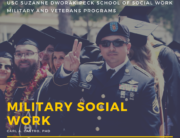The USC School of Social Work co-hosted the Military Child Education Coalition’s California Public Engagement conference, where more than 100 influential policymakers, community leaders, educators, religious leaders and military officials gathered to create the first statewide plan to support the education of military children in California.
Professor Ron Astor, who leads the school’s Building Capacity in Military-Connected Schools project, and Anthony Hassan, director of the USC Center for Innovation and Research on Veterans and Military Families, chaired the event, which took place Sept. 20 at the Radisson Midtown. The goal was to bring together decision makers to identify future directions in services for military children and influence policy at the state and national levels.
“California is in a strong position to make sure no one is lost in the transition from service member to civilian,” said Marilyn Flynn, dean of the School of Social Work, who noted the state’s advancements in research. “We have an opportunity to do this better than anyone since World War II.”
Many recommendations made at the event, such as training social workers, teachers and other school personnel, and improving school culture for military families, are central components of the work done by the Building Capacity project, the Center for Innovation and Research on Veterans and Military Families, military school liaison officers and military base programs.
For example, the Building Capacity team has been instrumental in working with the California Department of Education to add a question to the California Healthy Kids Survey asking all students if they have a parent or caregiver in the military. Now all 10,000 schools in California that participate in the survey will have an estimate of how many military students they have.
Many attendees at the event noted that the state is rich in resources and programs designed for military children, but the challenge lies in how to better coordinate and promote them.
Astor said that one top priority is the full implementation in California of the Interstate Compact on Educational Opportunity for Military Children, which seeks to remove barriers in educational services for military children. This program includes smooth transitions between schools, acceptance of academic courses from different states, support for participation in varsity athletics despite residency requirements and honoring military families. This is a nationwide effort that currently involves more than 40 states.
As participants discussed how to better support military children in schools, one of the ideas that emerged was the establishment of a statewide data and tracking system to identify where military children are attending school, including the children of National Guard and Reserve families. Currently, many school districts are not aware that they have military children in their region. Any such system would also need to include the children of veterans, considering the winding down of the United States’ involvement in the wars in Iraq and Afghanistan. California receives more returning military servicemembers and veterans than any other state, which increases the state’s challenge to provide adequate services to them and their families.
“It is crucial that we respect the sacrifices of our servicemembers and their families before, during and after their time in uniform,” USC Provost Elizabeth Garrett said.
Another idea that came out of discussions was the need to be proactive in providing services for military-connected children and their families instead of responding only after a problem has presented itself. Supportive programs need to focus on preventing difficulties and problems that can arise because of school changes, parental deployments and other stressful periods. This can be accomplished through an increase in services integrated into the community, such as after-school sports, youth groups, religious programs, tutoring, parks and recreation programs, and library programs.
Astor said that universities, particularly the University of California and California State University systems, should play an important role in training professionals to understand military culture and to recognize the unique challenges facing military children and their families. This should be required training for all teachers, administrators and student support personnel before they enter the workplace, he said.
Some of the participants, including prominent educational and military leaders, promised action. Monica Garcia, Los Angeles Unified School District board president, said she would call for a resolution recognizing military children in the district. Leaders in the California State University system said they would work to include these ideas in the training of teachers in bachelor’s and master’s programs. And Brig. Gen. Vincent Coglianese, commanding general of Marine Corps Installations West, invited members of the event to visit Camp Pendleton to observe model programs and resources that could be emulated elsewhere.
“This is something we can do as a society that will honor our promises to military families and veterans who endured great sacrifice for over a decade at war,” Astor said. “A proper homecoming and welcoming integration into society is something we all can contribute to.”







